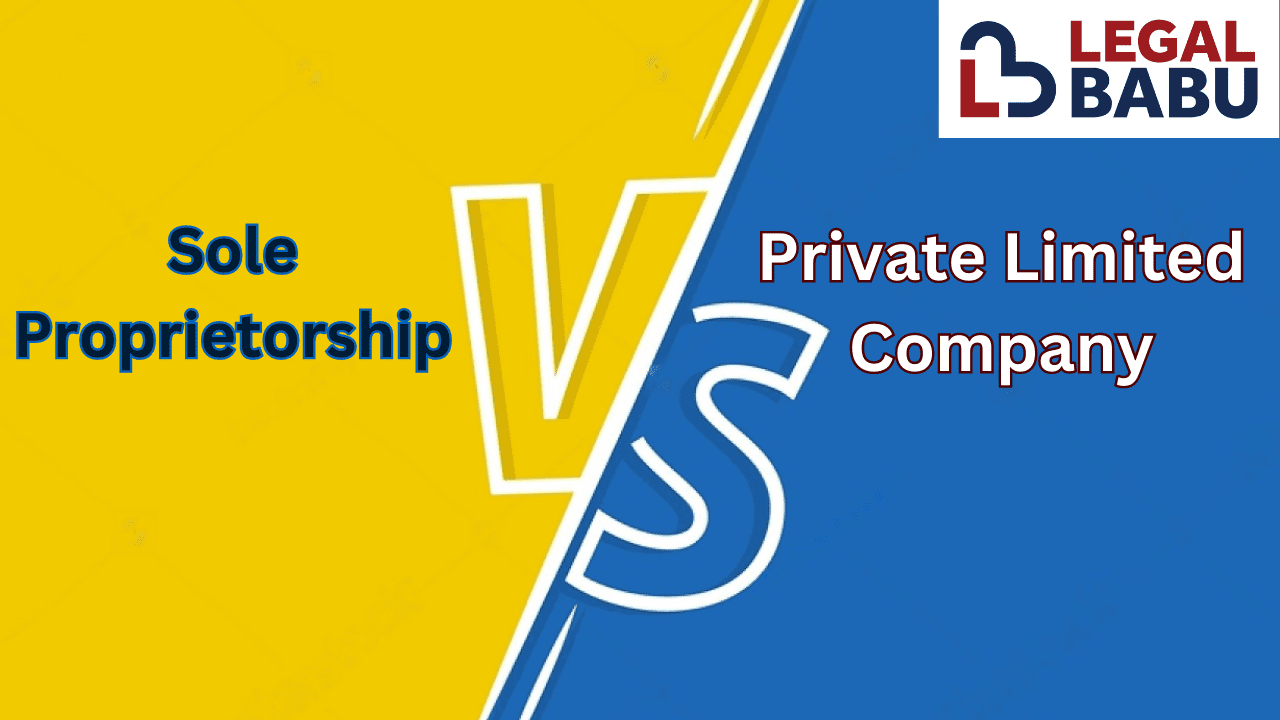Private Limited Company or Sole Proprietorship? | Legal Babu
- by legalbabu
- Updated Jul 27, 2024
- 8 mins read

Private Limited Company or Sole Proprietorship?
Choosing whether to start your business as a Private Limited Company or Sole Proprietorship is a huge decision that should not be taken lightly. Here you will find important information to help you choose the best legal structure for you and your small business.
Remember, making this choice wisely can save you a lot of hassle in the long run.
What exactly is a sole proprietor?
A sole proprietor is a self-employed person who owns and operates their own firm. A sole proprietorship means you’re the boss. You run your business on your own. You and your business are like twins – the same thing!
No fancy business registration is needed. Just focus on getting your GST registration, TAN registration, or shop and establishment license.
The sole proprietorship business structure is currently the most popular in India for starting a home based business.
What is a Private limited company?
Ever wondered what a Private limited company is? Well, it’s a business setup where the owners (they’re called members or shareholders) are like a different person from the business itself. Imagine it like having a twin – you’re separate, but you work together!
There is a distinct contrast between the individual or individuals involved in the business and the actual business.
Different types of limited companies exist, like private limited by shares ( PVT LTD), private limited by guarantee (also LTD), limited liability partnerships (LLP), public limited companies (PLC), and one person company (OPC). All of them need to be officially registered at the Ministry of Corporate Affairs (MCA), India’s official registrar of companies (ROC). You can gain a complete comparative analysis of various types of businesses.
Private limited businesses are the second most common business form in India, with private companies limited by shares being the most common type of limited company.
So that’s a quick overview of the two main structures, but what are the benefits and disadvantages of each? Let us explore.
Benefits of operating your business as a sole owner
If you opt to start your own business as a lone proprietor, you will be able to:
Begin right now – From the minute you open a bank account, you are regarded as a sole proprietor. Before opening a bank account, you must register with GST or TAN or MSME registration or obtain a shop act licence as self-employed as soon as possible, but there is no necessity to deal with the Ministry of Corporate Affairs (MCA).
Focus on your business – Running a sole proprietorship requires very little administration, with the only real filing obligation being to submit an annual Self Assessment tax return, also known as an ITR. This is fantastic news if your skill set is diverse.
Pay yourself whenever you want – Because there is no distinction between you and your business, you can withdraw money from it whenever you want, as long as there is enough money in the bank to cover taxes and other payments.
Navigate a difficult first year – It is usual for a small business to take some time to get off the ground. If your first year in business is financially hard, you will have the ability to offset business losses with other sources of revenue.
Privacy in Business: Your business’s financial records remain confidential. Generally, only the information you choose to share for marketing purposes becomes public, ensuring a level of privacy.
Disadvantages to running your business as a sole proprietor
However, as a sole proprietor, you will find that:
Financial Vulnerability: One major disadvantage is that your personal finances are at stake. Because there is no legal distinction between you and your business, any debts incurred or legal actions brought against your business may require you to utilise personal assets to settle them.
Tax Inefficiency: In many cases, the sole proprietorship model isn’t the most tax-efficient option. If your business grows and prospers, you will very certainly need to register as a private limited company and then you will have to start all over again.
Challenges in Raising Capital: Securing funding, like loans, can be challenging due to the lack of comprehensive financial transparency in this structure. Moreover, since you can’t offer investors a share in the business through stocks, attracting investment might prove difficult as investors often seek tangible returns.
Perceived Lack of Professionalism: Unfairly or not, some perceive the sole proprietorship structure as less professional. This perception could hinder your ability to secure contracts, as certain entities might prefer to engage with businesses that hold the more prestigious status of a Private Limited Company.
Uncertain Succession Path: In a sole proprietorship, the business is essentially you. Passing on the business to someone else can be more complex compared to a private limited company, where clear mechanisms for ownership transition are in place.
Being aware of these potential drawbacks can help you make an informed decision about whether a sole proprietorship is the right fit for your business goals and circumstances.
Advantages of running your business as a Private limited company
If you decide to form a Private limited company, you will be able to:
Personal Finances Protection: Shareholders of a limited company are liable only for the unpaid nominal value of their shares. This safeguard shields their personal assets in case of accrued debts.
Tax Efficiency: Generally, the limited company structure proves more tax efficient compared to a sole proprietorship, although this depends on your specific circumstances.
Enhanced Prestige: Choosing a Private limited company image sets you apart. Lenders, investors, and potential clients often prefer the professionalism associated with this esteemed structure over a sole proprietorship.
Smooth Succession Planning: Private limited companies exist as distinct legal entities from their founders. Shareholders can come and go, and transitioning ownership is relatively straightforward if you choose to step down.
Name Protection: Establishing a Private limited company secures your company name. This ensures exclusivity and prevents others from using a similar name. Such protection is absent in the sole proprietorship model.
By embracing the Private limited company model, you avail yourself of these advantages that contribute to financial security, credibility, and strategic growth possibilities for your business.
Disadvantages of running your business as a Private limited company
If you decide to form a Private limited company, you will notice that:
Formation Complexity: Creating a Private limited company involves more intricacies than starting as a self-employed individual. While the process can be somewhat challenging when registering with MCA, our company formation services offer swift and straightforward online assistance. Typically, companies are registered within 3 to 6 working days with our guidance.
Administrative Obligations: Operating a Private limited company necessitates specific administrative tasks. These include submitting an annual compliance statement and tax return to MCA, ensuring timely tax payments, maintaining accurate company records, updating registers, and informing MCA about any company changes. If this administrative load appears burdensome, our comprehensive Full Company Secretary Service can provide the necessary support.
Legal Responsibilities of Directors: Directors of a Private limited company, responsible for daily operations, shoulder various roles outlined in the aforementioned administrative section. Failure to fulfill these obligations can result in legal ramifications, including fines and potential imprisonment for severe breaches.
Public Disclosure of Company Information: To foster transparency in the Private limited company structure, company details, directorship, shareholders, and financial information are accessible through the MCA public register. While personal residential details of directors and shareholders remain confidential, certain company information, such as registered offices, is unavoidably available online.
Complexities in Payment: Withdrawing money from a company’s bank account isn’t as straightforward. Various methods, such as director’s salary, dividend disbursement, director’s loan, and expense reimbursement, are available but require precise adherence to correct procedures.
While a Private limited company brings advantages, being mindful of these potential challenges can help you make an informed decision aligned with your business aspirations.
Sole proprietor or private limited company – making your decision
When it comes to deciding between a sole proprietorship and a private limited company, remember that each business is unique, and your choice should align with your specific circumstances.
As discussed in the article, both options come with their own advantages and disadvantages. If the initial responsibilities of a private limited company seem overwhelming, you might want to start as a sole proprietor to test the waters. Keep in mind, though, that our comprehensive range of company secretarial services is available to offer support if needed.
However, if you’re prepared to take the plunge and seek financial security along with tax efficiency, opting for the private limited company structure is advisable.
In Conclusion
We trust that this article has provided valuable insights to aid you in your decision-making process between sole proprietorship and the private limited company setup. Should you have any inquiries, please complete the inquiry form, and we’ll promptly respond to assist you.


